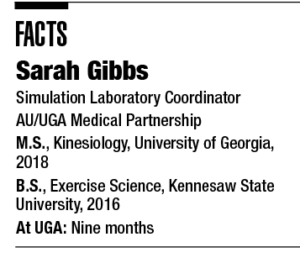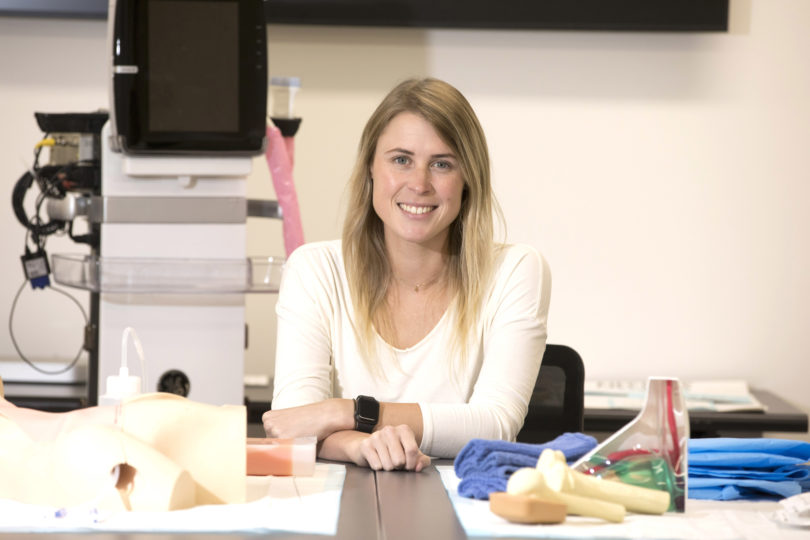(Originally published on Nov. 17, 2019)
To Sarah Gibbs, practice makes perfect.
And as coordinator of the Augusta University/University of Georgia Medical Partnership’s simulation center, she’s helping medical students get the practice they need as they start their careers.
“It gives them the opportunity to practice in a low-pressure environment, and it allows them to make mistakes and learn from them,” she said.
 Gibbs facilitates the logistics and operations of the simulation center. Students and faculty can participate in high-fidelity simulations, using simulation “manikins” such as Laerdal’s SimMan, to practice medical scenarios they might encounter. The center has adult, child and infant simulation manikins that can replicate a variety of emergency and nonemergency conditions. Gibbs helps plan the various scenarios and can control the simulation manikins remotely, even talking through them, to make it as realistic as possible.
Gibbs facilitates the logistics and operations of the simulation center. Students and faculty can participate in high-fidelity simulations, using simulation “manikins” such as Laerdal’s SimMan, to practice medical scenarios they might encounter. The center has adult, child and infant simulation manikins that can replicate a variety of emergency and nonemergency conditions. Gibbs helps plan the various scenarios and can control the simulation manikins remotely, even talking through them, to make it as realistic as possible.
On a given day, Gibbs assists faculty in running two simulations that last
30 minutes each, with a maximum of eight students (four students participating and four students observing, then reversing) in each session. The students and instructors debrief between the simulations. In January, up to 40 students will participate in simulations on a given day, thanks to recent renovations of Russell Hall on the Health Sciences Campus.
“They also help the students improve their patient communication,” Gibbs said.
In addition to communication skills, she said the simulations also serve to build their decision-making skills. The simulations also give the instructors a chance to provide much-needed feedback to the students.
Gibbs said the students are very eager to learn and are open to that feedback.
“You can tell that they want to present themselves professionally, from the way they dress to the way they speak to their general preparedness,” she said.
The students are presented with a new patient case at the beginning of their simulations, so they have little to no time to prepare and must think critically. They are meant to teach students how to respond during times of stress and answer questions accurately. It also helps them practice translating complex medical language to terms that patients, especially children, can easily understand.
Every simulation is different, and Gibbs also learns from each one. She takes notes so that she can troubleshoot before the next simulation. She likes working with the ever-changing technology of simulation and still finds medicine and science fascinating.
Gibbs received her bachelor’s degree from Kennesaw State University, where she majored in exercise science. She knew she wanted to go to graduate school and decided on UGA’s clinical exercise physiology program in the kinesiology department of the College of Education. She then did an internship at Piedmont Athens Regional that she said opened her eyes to the applications of her studies. Gibbs plans to work with patients in the future.
Gibbs is also a medical service officer in the Army Reserve. She got her start in UGA’s ROTC program.
“Being an officer in the Army has always been a goal of mine,” she said. “The leadership training and experiences that I get in the Army really allow me to be challenged.”
In her free time, Gibbs enjoys photography, particularly landscapes and architecture, and plans to compete in an Olympic-distance triathlon. It would be her fifth triathlon but her first at that distance.
For now, Gibbs is helping prepare students for the long haul of starting their medical careers.
“There’s a lot of work behind the scenes and preparation that goes into the simulations,” she said.








